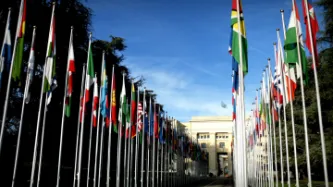Advanced Search
Content Type: Press release
Privacy International welcomes the Committee’s report on the draft Investigatory Powers Bill (IP Bill). The report mirrors what many from across the technology sector and civil society have been saying: the lack of clarity in the draft Bill risks undermining security and privacy.
The Committee encountered almost universal confusion regarding the meaning of “Internet Connection Records” and what the collection of such records would entail. …
Content Type: News & Analysis
In 2015 the United Nations' human rights mechanisms significantly increased their capacity to monitor and assess states' compliance with their obligations around the right to privacy. Notably, the Human Rights Council established the mandate of the Special Rapporteur on the right to privacy, filling a significant gap in the international human rights protection system. Meanwhile, the Human Rights Committee put surveillance laws and practices in a range of countries under close scrutiny, making…
Content Type: News & Analysis
As we mark the 750th anniversary of the first parliament called in Britain, its time for intelligence agencies to tell the truth.
After the fall of the Berlin wall, the new German government dedicated its commitment to democracy by physically building transparency into the political process - the impressive glass cupola of the Reichstag, the expansive glass walls of the ministry buildings and in the chancellery all encourage public curiosity and…
Content Type: News & Analysis
The major overhaul of data protection laws in Europe is finally over, after three years of arduous and sustained political and lobbying activity by all those with a major stake and interest, including us at Privacy International (See our initial analysis of the two laws in 2012). We welcome this long overdue closure, but is this 91-articled, 200-paged piece of legislation been worth the enormous effort and no doubt millions of euros, dollars and pounds spent on it?
The legislative package…
Content Type: Press release
Statement by European Digital Rights (EDRi), Bits of Freedom, Digitale Gesellschaft e.V, Digital Rights Ireland and Privacy International following the vote of the European Parliament’s Civil Liberties Committee on the Data Protection
In January 2012, the European Commission, following extensive consultations, published a draft Regulation and a Directive to create a strong framework for data protection in the EU. The initiative had three priorities – modernisation of the legal framework for…
Content Type: News & Analysis
In an enormous breakthrough for those seeking transparency and accountability to the shadowy surveillance industry, the Swiss Government has been forced to publish the list of export licenses for surveillance technologies and other equipment, including details of their cost and destination.
The decision by the Federal Information and Data Protection Commissioner comes on the heels of consistent pressure from Privacy International, Swiss journalists, and several Members of Parliament on…
Content Type: News & Analysis
Sometimes it takes an unexpected stranger to remind you what you have, and what you are at risk of losing. Roman Zakharov, a Russian publisher who challenged Russia’s surveillance legislation, is that stranger for many Brits and Europeans. The Grand Chamber of the European Court of Human Rights judgement on Friday 4 December 2015 was remarkable, not because it tore up the rule book on the jurisprudence surrounding state surveillance in the Council of Europe, but because it followed…
Content Type: News & Analysis
Internet Connection Records are a new form of communications data created by the Investigatory Powers Bill at Parts 3 and 4. They constitute an unlawful interference with privacy with the ability to provide a highly detailed record of the activities of individuals, profiling their internet habits.
Clause 62 of the Investigatory Powers Bill (“IP Bill”) permits a wide range of public authorities to collect Internet Connection Records, however throughout debates on this highly controversial new…
Content Type: Press release
This is Privacy International's submission in response to the Science and Technology Committee's call for evidence on the draft Investigatory Powers Bill.
Content Type: News & Analysis
This guest post was written by Nighat Dad and Adnan Chaudhry of Digital Rights Foundation.
It is the role of the state to protect its citizens from threats to their life and liberty. But in protecting its citizens, the state’s own aims cannot be counterproductive and erode the security found in rights like privacy and freedom of expression that are vital to a democratic system.
However, it has too often been the case that governments will pursue and enact legislation that provides more…
Content Type: Press release
Documents released today confirm GCHQ, the UK intelligence agency, is hacking computers in the United Kingdom without individual warrants. The documents contain previously unknown details and defenses of GCHQ's use of "thematic warrants" to hack. The legal challenge in which these documents are being disclosed was brought by Privacy International and seven internet and communications service providers from around the world in response to disclosures made by Edward Snowden.…
Content Type: Press release
A 400 gigabyte trove of internal documents belonging to surveillance company Hacking Team has been released online. Hacking team sells intrusive hacking tools that have allegedly been used by some of the most repressive regimes in the world.
The documents reportedly confirm Hacking Team has customers in 35 countries, including some that routinely abuse human rights. These documents seemingly validate research conducted by Citizen Lab…
Content Type: Press release
A joint statement from international and domestic civil society organisations expresses continued serious concerns regarding the passage of Pakistan’s Prevention of Electronic Crimes Bill. Privacy International, ARTICLE 19, Human Rights Watch, Association for Progressive Communications, Digital Rights Foundation, and other human rights organisations including the Human Rights Commission of Pakistan are calling for the bill currently awaiting debate in the National Assembly to be scrapped and…
Content Type: News & Analysis
The relationship between users and companies is based primarily on trust. However, many recent developments have the potential to undermine this trust and to question companies loyalties to their users. From excessive data collection and transmission to the failure to guard against basic security risks, one could be forgiven for thinking that the privacy and security interests of users and devices have taken a back seat. Governments of the world are unilaterally endeavouring to…
Content Type: Press release
Privacy International is deeply disturbed by the Moroccan government’s crackdown on media, human rights defenders, and civi society. Our friend Hisham Almiraat will be appearing in court on Thursday November 19th, 2015 along with six other journalists and human rights defenders members, and is facing the charges of “receiving foreign funding without notifying the General Secretariat of the government” and charges of “threatening the internal security of the State”, an offense that can lead…
Content Type: Long Read
Written by Eva Blum-Dumontet
A recent case of lèse-majesté in Thailand (speaking ill of the monarchy) is a worrying example of how Western companies do not just work with governments that fall short of international human rights standards, but can actually facilitate abuses of human rights.
Our investigation on the trial of Katha Pachachirayapong — accused of spreading rumours on the ill-health of the King Bhumibol Adulyadej, thereby causing sharp falls in the Thai stock market — reveal the…
Content Type: Report
In response to the Government publishing proposed new surveillance powers in November 2015, Privacy International submitted this highly detailed analysis to the Science and Technology Committee on the Draft Investigatory Powers Bill in November 2015. Our report proposes significant changes across the Bill to ensure better privacy protection while still enabling public bodies to have the powers they need.
Content Type: News & Analysis
The UK Government introduced a draft surveillance bill on Wednesday – the innocuously named 'Investigatory Powers Bill'. Trumpeted as 'world leading' by the Home Secretary, the only sense in which this is true is that other Governments around the world will now also seek a mandate for mass surveillance and hacking.
Until recently, the idea that a Government agent could hack a mobile phone and turn on its camera and microphone to bug a conversation in a room was the realm of science fiction, or…
Content Type: Press release
Privacy International has today written to the Investigatory Powers Tribunal (IPT), the secret court that hears complaints about the UK's surveillance regime, to demand that the Government comes clean about when and how it began collecting bulk communications data in the UK, and just as importantly, who knew of and approved the operation.
Last Wednesday, on the very day that the Government published its draft Investigatory Powers Bill, an era-defining piece of legislation that the Home…
Content Type: News & Analysis
On legal reform
"RIPA, obscure since its inception, has been patched up so many times as to make it incomprehensible to all but a tiny band of initiates. A multitude of alternative powers, some of them without statutory safeguards, confuse the picture further. This state of affairs is undemocratic, unnecessary and – in the long run – intolerable." [E.S. 35]
This report is confirmation of the pressing need for wholesale reform of Britain's surveillance laws. Mr Anderson is…
Content Type: News & Analysis
With powers to snoop on our communications that are unprecedented anywhere in the world, it is essential the Investigatory Powers Bill doesn't let politicians decide who is spied on.
The bill, if it is passed, aims to give the police and intelligence agencies sweeping powers to scoop up our emails, phone calls and text messages; and access details about when, where and with whom we communicate; and even hack into our computers and smartphones. At Privacy International, we have many concerns…
Content Type: News & Analysis
This is a guest piece. It does not necessarily reflect the views or position of Privacy International.
In 1997, plans for a Civil Identification Registry (RIC) were signed into law in Brazil, promising to unify the 27 regional identification registries into a centralized federal one by 2020. The law, which was only enacted in 2010, continues to face obstacles to its implementation, but in 2014 there was a renewed wave of support for the project from the Ministry of Justice…
Content Type: News & Analysis
Despite Wednesday's publication of the Investigatory Powers Bill being trailed as world leading legislation that would balance security and privacy, what the Government is actually seeking is a mandate for mass surveillance. This is a new Snoopers' Charter and we must oppose many of its most virulent elements.
The true debate on surveillance can now begin. After years of downplaying, obscuring, and denying the Snowden revelations, the Government has finally joined the conversation about the…
Content Type: Press release
Privacy International said
"The true debate on surveillance can begin today. After years of downplaying, obscuring, and denying the Snowden revelations, the Government has finally entered the conversation. For the first time Parliament and the British public will be able to debate mass surveillance powers like bulk interception, bulk hacking, and the data-mining of bulk personal datasets.
This Bill will be one of the most important pieces of legislation for a decade to get right for our civil…
Content Type: News & Analysis
Photo: Flickr/Elvert Barnes. Some rights reserved.
In the wider civil society space, the opportunities for travel come thick and fast. From the multi-stakeholder perspective, the Internet Governance Forum will be held during November in João Pessoa, Brazil. There is the Stockholm Internet Forum in, naturally, Stockholm. In freedom of expression there is the International Freedom of Expression Exchange Strategy Conference in Trinidad & Tobago, while End…
Content Type: Report
Privacy International's new report, For God and My President: State Surveillance in Uganda, exposes the secret surveillance operation and the government's attempts to buy further powerful surveillance tools, including a national communications monitoring centre and intrusion malware, in the absence of a rigorous legal framework governing communications surveillance
Content Type: Press release
Ugandan President Yoweri Museveni directed intelligence and police officials to use a powerful, invasive malware to spy on domestic political opponents – including parliamentarians, activists and media houses – following the 2011 presidential election, during a period of urban unrest and police violence, according to secret government documents obtained by Privacy International. A feature broadcast piece will air on BBC Newsnight on Thursday, 15 October.
Privacy International's new…
















